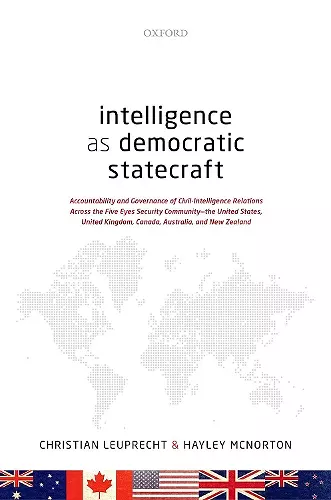Intelligence as Democratic Statecraft
Accountability and Governance of Civil-Intelligence Relations Across the Five Eyes Security Community - the United States, United Kingdom, Canada, Australia, and New Zealand
Christian Leuprecht author Hayley McNorton author
Format:Hardback
Publisher:Oxford University Press
Published:16th Sep '21
Currently unavailable, and unfortunately no date known when it will be back

This book features a comparative study in intelligence accountability and governance across the Five Eyes: the imperative for member countries of the world's most powerful intelligence alliance to reconcile democracy and security through transparent standards, guidelines, legal frameworks, executive directives, and international law. It argues that intelligence accountability is best understood not as an end in itself but as a means that is integral democratic governance. On the one hand, to assure the executive of government and the public that the activities of intelligence agencies are lawful and, if not, to identify breaches in compliance. On the other hand, to raise awareness of and appreciation for the intelligence function, and whether it is being carried out in the most effective, efficient, and innovative way possible to achieve its objective. The analysis shows how the addition of legislative and judicial components to executive and administrative accountability has been shaping evolving institutions, composition, practices, characteristics, and cultures of intelligence oversight and review in the United States, the United Kingdom, Canada, Australia, and New Zealand using a most-similar systems design. Democracies are engaged in an asymmetric struggle against unprincipled adversaries. Technological change is enabling unprecedented social and political disruption. These threat vectors have significantly affected, altered, and expanded the role, powers and capabilities of intelligence organizations. Accountability aims to reassure sceptics that intelligence and security practices are indeed aligned with the rules and values that democracies claim to defend.
An invaluable vade mecum to all who are curious about how democratic countries might improve the ways in which they collect and act upon intelligence. This book is a model of its kind. * David Haglund, Queen's University, Canadian Journal of Political Science *
To protect themselves, democracies have created intelligence agencies to monitorthe world for threats. Technology allows these agencies to mine the data andsurveil the movement of citizens and non-citizens with ease and in secrecy.The question then becomes who watches the watchers, how can democracieshold these agencies accountable? Christian Leuprecht and Hayley McNortonsearch for answers in an excellent comparative study of the Five Eyes. * Harvey M. Sapolsky, Professor Emeritus MIT and Former Director of the MIT Security Studies Program *
A highly readable book which is a very useful narrative and up-to-date descriptionof intelligence and security organizations in the UK, the US, Canada, New Zealand,and Australia. Its central theme is the evolving challenge of making theseorganizations responsible and accountable in various ways to electeddemocratic governments. * Jennifer Stoddart, PhD, O.C., AdÉ, Sixth Privacy Commissioner of Canada & Strategic Advisor, Privacy and Security Group, Fasken Law. *
Democratic governments seeking to act ethically in their own defence dailyconfront adversaries that play by very different rules. Christian Leuprechtand Hayley McNorton well document how effective accountability and oversightmechanisms have developed for the Five Eyes intelligence partners that can giveconfidence that in keeping us safe they are nevertheless abiding by the ruleof law and democratic values. * Sir David Omand, Professor, King's College London; Vice-President, Royal United Services institute; former Director, Government CommunicationsHeadquarters (GCHQ), Permanent Secretary to the Home Office andSecurity and Intelligence Coordinator in the Cabinet Office. *
Intelligence as Democratic Statecraft thus constitutes an important contribution to the literature on intelligence oversight by offering a comparative description of the Five Eyes alliance and by suggesting a link between domestic structures and significant intelligence cooperation. * Professor James J. Wirtz, Department of National Security Affairs, Naval Postgraduate School *
The authors provide a useful and sufficiently detailed sketch of the ISA governance complexes in each country and discover several interesting trends as well as novel exceptions worthy of deeper exploration. * George Greanias, H-War *
ISBN: 9780192893949
Dimensions: 240mm x 165mm x 20mm
Weight: 576g
262 pages